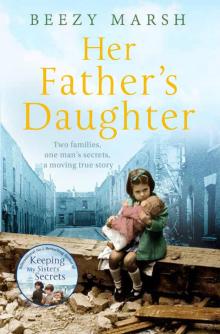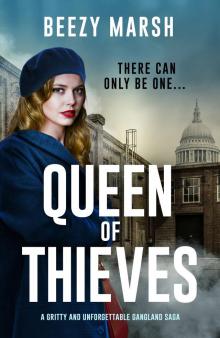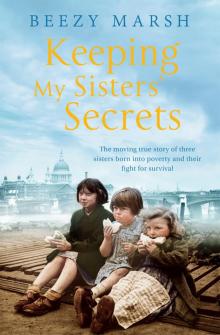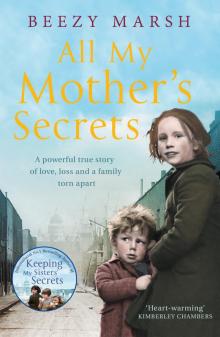- Home
- Beezy Marsh
Keeping My Sister's Secrets Page 16
Keeping My Sister's Secrets Read online
Page 16
The jewellery department on the ground floor was a haven of calm compared to the rest of the shop, with smart-suited, bespectacled men heading the sales teams. Beads of sweat formed on Eva’s brow from the insulating effect of the furs she was carrying but she didn’t dare unbutton her coat, in case anyone noticed. She waddled slightly when she walked. Maggie was already at the counter, asking to look at some rings, which sparkled with emeralds, rubies and diamonds. The shop assistant pulled out a tray which he laid on the counter. Eva grabbed a ring and walked towards the door with it. In an instant, she had been apprehended, roughly, by another shop assistant. ‘I just want to see it in the light!’ she said. ‘I’m not stealing it!’
‘Why don’t we take it back to the counter, to avoid confusion?’ he said in his most paternal tone.
Maggie chided her. ‘How many times have I told you? Do not walk off near the doors with expensive things! People might get the wrong idea.’ She turned to the shop assistant, who was now acting as an escort to Eva. ‘I must apologize for my daughter’s behaviour. She just sees beautiful jewellery and wants to look at it in the best light. It is rather dingy in here, don’t you agree? And so stiflingly hot. Shall we go now, dear?’
Eva nodded. They made their way towards the entrance and through the doors, out into the freezing cold air of a January afternoon in Oxford Street. ‘Worked like a treat!’ said Maggie, with a laugh. ‘By the time they realize one of their rings is paste, not diamond, we’ll be back down the Elephant.’ At the Tube station, the newspaper boys were still yelling about the death of the monarch. Eva couldn’t say she felt sad about it; he was an old bloke and he had lived a life of luxury, and there would be another king, which probably meant another street party for the coronation – which was something to celebrate, really.
They had bought their tickets and Eva was through the barrier, standing at the top of the escalator, when she heard a voice shout, ‘That’s her! Hey, you! Stop!’
The shop assistant from Selfridges came running towards them, with a policeman by his side. The cozzer reached out and grabbed Maggie’s arm. She started to shout, ‘Get off me!’, but he held firm. With her free hand, Maggie reached around the back of her hat and pulled out her hatpin. Eva saw it glint momentarily before she plunged it right into the policeman’s eye. Blood spurted out and he screamed. Eva saw Maggie disappearing under a hail of blows from bystanders who had turned have-a-go hero after witnessing the dreadful attack. There was nothing else to do; Eva turned, as calmly as she could and walked slowly, very slowly, down the escalator, not looking back, her heart thumping as Maggie yelled like a banshee for her liberty.
‘Blood? How much blood was there?’ The colour drained from Alice Diamond’s face as Eva brought home the news of Maggie’s assault on the policeman.
‘And you are sure she didn’t get away?’
‘Certain,’ said Eva. ‘She had half of Oxford Street sitting on her back, the last I saw of her. I should have helped . . .’
‘No,’ said Alice. ‘You did right, getting away. Makes no sense having both of you in clink. And you are sure you weren’t followed?’
‘I wasn’t,’ said Eva. She’d spent an hour wandering around the Elephant to make sure of that before coming to Alice’s flat.
Alice stood up and took her teacup to the sink. ‘Well, she’d better hope the cozzer doesn’t bleed to death because if he does, she’ll swing for it, the silly cow.’
Eva blanched. She knew the death penalty was a real threat and the thought of Maggie swinging on the end of a rope made her feel physically sick.
Alice went on: ‘And sticking him with her hatpin like that. Well, she’s hardly helped herself because I won’t be able to nobble the jury, that’s for sure. Too many witnesses. The best I can do now is make life more comfortable for her in Holloway.’
The tentacles of Alice’s crime operation seemed to spread below the streets of London, like some giant octopus. Eva found that reassuring and terrifying in equal measure. It meant there was little chance of escape, if she ever wanted to leave. She mulled that thought over as she made her way back home through the freezing fog. The shouts of costermongers parking their barrows up for the night under the railway arches echoed up the road as she turned into Howley Terrace.
The savoury smell of liver and onion filled the house as she opened the door. It was just what she needed to put things right. Her mother gave her a weak smile and her father didn’t look up from his plate when she came into the scullery.
‘How was school?’ Mum ventured.
‘Just give it up, will you?’ said Dad, banging his fist on the table. A splodge of onion gravy landed on the table in front of him. He looked up at her. Eva started to shake. It was as if all the fear of what had happened that afternoon had found its way into her legs, which had turned to jelly. She grasped the back of the little wooden chair in front of her, to steady herself.
‘It was a nice day,’ she managed to say, before sitting down.
‘Liar!’ her father said, upending the whole table, sending his plate right into Eva’s lap. She yelped and jumped up as the scalding gravy seeped through her dress and onto her bare legs. She cried out in pain and shock.
‘Leave her alone!’ screamed Mum, running with a dishcloth to clean her up.
Dad turned to the grate and pulled out the poker. He waved it at Eva.
‘You’re a liar and a thief. Get out of my house before I give you what you deserve!’ he spat. His eyes were bulging out of their sockets and his face was puce with rage. ‘I know you’re one of those Forty Thieves.’
Thoughts were racing through Eva’s mind. Who had betrayed her? Could it have been Peggy? Eva knew she disapproved but she had never thought she’d betray her like that.
‘No, James, no!’ yelled Mum, ‘You’ll not throw her out! She is the one who has been putting food on the table all these months. Who do you think keeps us going? It ain’t you, that’s for sure, with your paltry wages—’
Dad slapped Mum hard, right in the mouth, with the back of his hand, and sat down in his chair. He spoke in a whisper, ‘So, I’m to be disobeyed in my own house, am I? You can both get out of my sight.’
Mum put her arm around Eva. ‘Don’t worry. I’m going. I’ve had enough of you. And she’s coming with me.’
That seemed to take the wind out of his sails. Dad sank down into his chair, with his head in his hands. Mum stormed upstairs, with Eva in hot pursuit. She ran into the girls’ bedroom, pulling her few belongings from the chest of drawers they shared. She ripped the sheet from Eva’s bed and threw everything in. ‘Tie that lot up,’ she ordered. Eva watched as her mother reached up on tiptoes and took a carpet bag and a hat box from the top of the wardrobe. The pair of them hurried back down the little staircase, half expecting Dad to come at them through the scullery door.
Emboldened by the fact that he hadn’t stirred, as she slammed the door, Mum shouted, ‘And good riddance to bad rubbish!’
The curtains were twitching over at number 16, where Mrs Davies, no doubt, was drinking in the unhappy scene, ready to repeat it to all and sundry. Eva flicked the Vs as she walked past, for good measure, just in case the nosy old bag was watching.
17
Peggy, February 1936
14th February 1936
Dearest Peg,
I’m sorry not to have written sooner but there is so much to tell you. The matron in the home is very strict about letting us out of her sight to get to anywhere near a post box, so I had to bribe one of the cleaners with some of the fags my dear old mum sent me to get this letter to you.
I had the baby, Tommy, and he is nearly one now, Peg, and the most beautiful thing ever. He doesn’t look anything like Bert to my mind, which is a blessing. We have to do a lot of chores, cleaning, helping, but I don’t mind because once you get past the matron, the rest of the staff are quite kind.
And I could do without having to repent for my sins but we have to do that once a week and go to church in
a long line, pushing our prams, while the gossips in the neighbourhood stare. I had Tommy baptized as soon as I could because you never met a more innocent little baby and it seemed right.
I came to the unmarried mothers’ home up in Hampstead about three weeks before the birth. My dad threw me out long before that and I was with one of my aunts over in the East End for a while, until my bump got so bleeding obvious I looked like the back end of a bus and I couldn’t leave the house. Coming here was fine because I was with other girls who had got themselves into trouble, just like me. A lot of them didn’t want to keep their babies and they left soon after they had them. Theirs were fostered out but not mine. I’m allowed to stay here until he is one.
My dad still won’t speak to me but my mum gets up here as often as she can. She can’t afford to take us in, Peg, and in any case my dad won’t allow me to set foot in the house again, so that is that.
I am hoping that I might get some help from the Poor Law to keep him, to get a foster grant so I can put him with a foster mother during the day while I work and then have him at night and my days off. If I can do this, I have no idea where I will end up but it seems I will be far from home because my dad won’t want me on his doorstep.
How is life at the Post Office? Is that old bat Miss Fisher still ruling with a rod of iron? Write to me soon, Peggy. Just any little bit of news from you will brighten my day.
Take care,
Your friend,
Susan.
Peggy clutched the letter in her hand as she ran to meet George at the Gaumont Cinema in Walworth. Peggy had given up hope of ever hearing from her friend again. The letter came like a bolt from the blue and although it was good to hear her news, Susan had been through so much, all on her own, and Peggy knew that her future was far from certain. At least she saw having the baby as something positive and was enjoying looking after him, but how would she cope on her own, in a world in which being an unmarried mother would make her the talking point of the street? Peggy couldn’t help wondering whether Susan might have been better off just giving the baby away at the start, right after she’d had him. As a single girl at least she could have got a job somewhere new and put all of the past behind her.
Peggy wasn’t sure what she’d write to tell her. The Post Office Savings Bank hadn’t changed much in comparison with what Susan had been through. Edna was in charge now and she seemed to delight in bossing everyone about even more than Miss Fisher had. Who could have guessed that quiet little Edna from Acton would turn into such a martinet? She picked on the weakest and constantly found fault with their work. There was a new girl called Sarah, from north London. Peggy felt sorry for her and tried to show her the ropes, really she did, but Sarah was ever so clumsy and just couldn’t get her numbers right. She’d have been better off working somewhere else, maybe in one of the factories.
Peggy knew that having a clerical job meant she was brighter than most, but she also realized that there were hundreds of girls who would give their eye teeth to be able to get such a job, away from the drudgery of packing and filling and labelling, like her little sister Kathleen. Peggy felt very fortunate indeed.
She caught sight of George – tall, blond and handsome – standing around whistling to himself, carrying a single red rose, waiting for her, on their Valentine’s Day date. Peggy stuffed Susan’s letter into her purse. She didn’t want to discuss it with him but she didn’t want to leave it at home either, in case her dad found it. He’d been in a terrible depression since Mum walked out. Eva had gone too and wasn’t speaking to Peggy any more, which she found so hurtful. Eva seemed to think that Peggy had grassed her up to their dad for stealing, and no amount of talk would persuade her that this was not the case. It was more likely to have been that awful gossip Mrs Davies at number 16. She knew better than to ask her father who had told him about Eva and the Forty Thieves. It was a closed subject.
When Mum left, she went to her friend Flo’s down in the Borough at first and after a week she rented a little place, with Eva’s help, above a shop on Walworth Road. Throughout it all, Dad sat in a kind of dumb trance at the table in the scullery after work, muttering to himself under his breath. Peggy stayed with her father out of loyalty; she hated to see him like that. She’d always admired him for his strength of character, his understanding of the world and, although she wasn’t comfortable with the way he was too handy with his belt, she tried to forgive him for that. Peggy was practical enough to know that he would need help to pay the rent on Howley Terrace, so they wouldn’t lose the house. She didn’t want them to be turfed out of their family home. Deep down, Peggy was clinging to the hope that her mother would return, although with every passing week, that seemed less likely. Her brother Jim chipped in with some of his wages. He didn’t earn much as a post boy but he wanted to stay with his dad. Frankie, now twelve, had gone with Eva and their mother, while Kathleen acted as a sort of go-between, staying over at Nanny Day’s and relaying messages between the parents when required.
Peggy suspected, but she didn’t know for sure, that Mum might have a fancy man in her life. She’d cut her hair into a fashionable long bob and went to the hairdresser to get a Marcel wave. Mum also took full advantage of the little luxuries Eva brought her – a mink stole, a new handbag, some lipstick. She felt she was unencumbered without her brutish hubby and was now a regular on Friday and Saturday nights at the pub. She let it be known that she was out to have fun. Kathleen had told Peggy that Mum had even hosted get-togethers after hours at the flat, with crates of beer and raucous singing until the early hours, until the neighbours complained and the landlord threatened to chuck her out on her ear. It was as if she was making up for lost time, all those years slogging away with the kids and being beaten by their father.
Peggy had told George a little bit about it. He hadn’t wanted to pry, he said, and he didn’t judge what her father had done harshly – that wasn’t his place – but he said that if he was ever lucky enough to marry, he would never lay a finger on his wife in anger. That made Peggy feel quite safe; just seeing him standing there made her feel warm inside. His shoulders were broad and he had a lovely smile. He gave her a little wave and offered her the Valentine’s rose. Like the perfect gentleman, he paid for their tickets and slipped his arm around her once the lights went down.
They had kissed a couple of times, just a little peck, really, but tonight when the heroine was embraced by the hero, George took that as his cue. He put his hand on her knee and tried to kiss her full on the mouth. Something inside Peggy froze. She resisted and it ended in a clash of lips and teeth. ‘I’m sorry,’ she whispered. ‘I just can’t do that yet.’ Her head was swimming with thoughts of Susan and Bert in the alleyways of Soho, of what a man’s desire would feel like and how terrified she was of getting pregnant. It all twisted into a big knot in her stomach.
She could sense that George was rather crestfallen, as he whispered back, ‘I’m sorry, Peg, I don’t know what got hold of me there.’
There was a loud shush from the row in front, and a woman wearing the most ridiculous feathered trilby turned round and said, ‘Go and get a bleedin’ room. You’re spoiling the film for the rest of us!’
‘And your hat is spoiling the view!’ said George, making Peggy giggle.
When the lights came up, they both scarpered for the exit, like a pair of naughty children, in case she clouted them one with her handbag. Their botched kiss was forgotten as they strolled along, hand in hand.
George was quick to start a conversation and Peggy gratefully joined in, back on the safe ground of politics. They discussed things they had read in the paper and George seemed to relish Peggy’s views, even if they weren’t always the same as his own. She loved that too – the fact that they could really discuss things, without falling out with each other.
‘I’m going to a meeting next week, Peg; would you like to come with me?’ said George as they reached the turning for Belvedere Road. He didn’t walk her to her door as she preferred to
go up the street alone, in case Mrs Davies or Mrs Avens spotted them and made comments to her father. It was just not worth the grief.
‘What kind of meeting?’
‘Well, me and some of the lads at the depot have joined the Communist Party . . .’ He lowered his voice.
‘Some of their ideas are a bit much, aren’t they?’ said Peggy, who remembered Miss Fisher’s scant regard for such left-wing political shenanigans.
‘Peggy, there are other views out there which are a lot more worrying: the Fascist lot, for a start. The Blackshirts are holding meetings all over the place, spreading hatred. They’ve got to be stopped,’ said George. ‘Their last big meeting in Olympia they beat the living daylights out of anyone who tried to speak against them. Several comrades ended up in hospital.’
‘But what can you do? It’s not like you have any power over them, working at the depot, is it?’
‘Still, we’ve got to exercise our right to oppose their views. Think about it, Peggy. Extremists like Mosley will be stopped if people are brave enough to speak out. These Blackshirts have been stirring up the East End against the Jews. People like trade unionists are already being thrown in prison in Germany. We can’t let that happen here, can we?’
Peggy thought about it for a moment and felt excitement twisting in the pit of her stomach. Her family had always struggled, worked hard, but they didn’t seem to get very far. Eva was busy lining her pockets with stolen goods and Kathleen was bottling jam, while her mother scrubbed floors and her dad was killing himself keeping the boilers going down at the cricket bat factory. They had nothing against people from other countries and places. They were all just as poor as each other. She was stuck in a safe little job as a clerical worker with not much hope of promotion. But George was different. He believed in something, a greater good. This was her chance to make a difference.

 Her Father's Daughter
Her Father's Daughter Queen of Thieves
Queen of Thieves Keeping My Sister's Secrets
Keeping My Sister's Secrets All My Mother's Secrets
All My Mother's Secrets